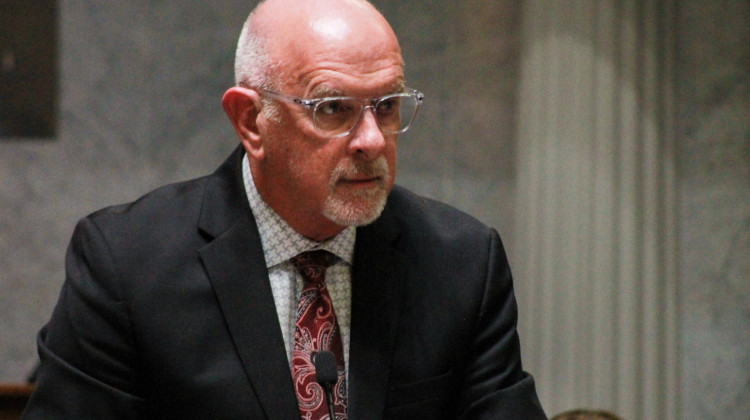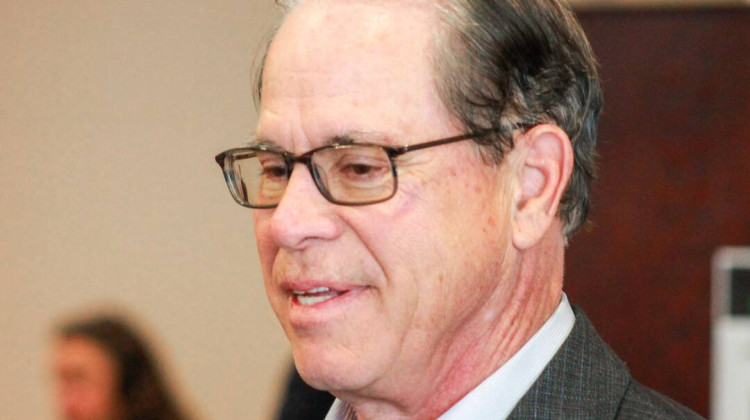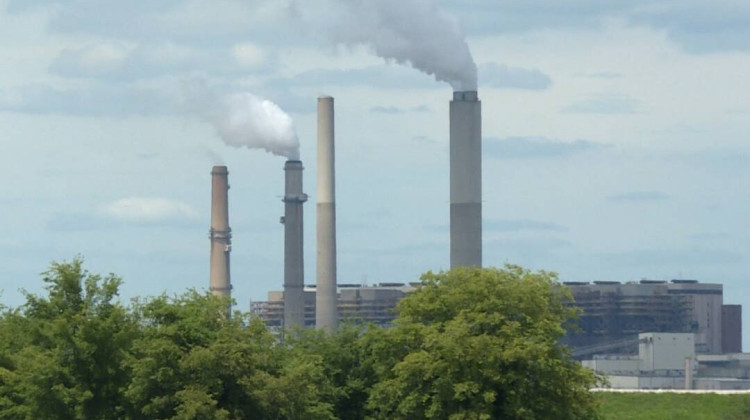
Natural gas peaker plants, like the Kearny Generating Station in New Jersey seen here, only operate at times when energy demand is high.
Jim Henderson/Wikimedia CommonsSeveral Indiana utilities are closing their coal plants and replacing them with renewable energy sources like wind and solar. Some are also adding natural gas peaker plants — plants that only run when the demand for energy is high.
While utilities say they need these plants to serve as a backup when the sun isn’t shining and the wind isn’t blowing, environmental activists say they’re unnecessary, polluting, and costly for customers.
Who’s right? It’s not that simple.
Indiana Public Broadcasting asked Juan Pablo Carvallo, a research scientist with the Lawrence Berkeley National Laboratory — which is funded by the U.S. Department of Energy. His team looks at the intersection of policy and technology development.
Carvallo said there are pros and cons to natural gas peaker plants. On the one hand, they can be used at any time — unlike power that relies on the weather. Carvallo said, historically, natural gas has also been pretty cheap and it's something utilities are familiar with.
On the other hand, Carvallo said peakers are pretty inefficient — because they’re used when demand is high, they only run about 3 percent to 5 percent of the time. That makes them costly for how little they’re used.
While there’s no one right answer for every utility, Carvallo said Indiana utilities could be doing more to explore their options and leverage power from the grid.
Indiana utilities hesitate to branch out to newer tech
Natural gas peaker plants aren’t the only way to make up for losing resources that can run at any time like coal, Carvallo said. He looked at the long-term plans for two Indiana utilities that plan to build gas peaker plants — NIPSCO and CenterPoint. Carvallo said the utilities didn’t seem to consider other options as much.
“Utilities tend to fall on the side of, ‘OK, this is something I know how to operate, I know how it works’ — which is natural gas plants. ‘This new technology, not exactly sure how to deal with it, so I’m going to ignore it,’” he said.
Carvallo said battery storage can be a good alternative. Once it’s installed, it’s a zero emissions resource and — while expensive — he said the cost is coming down. While NIPSCO has some battery storage in its long-term plan, Carvallo said batteries were largely dismissed by CenterPoint.
Carvallo said NIPSCO and CenterPoint also didn’t thoroughly assess what’s called demand response — where they can offer incentives to certain customers to use less power or shut their power off if high demand for power threatens to cause a blackout.
Utilities look at resources like coal, natural gas, wind, and solar in different ways — comparing how well they can help to meet load in the hours of most need and how cost effective they are. But Carvallo said demand response typically isn’t treated the same way — but it should be.
“So in some ways they're leaving resources on the table that could be cost effective. Or it could be a mix. For example, you could have maybe a small peaker and a bunch of distributed resources and potentially a battery,” he said.
Join the conversation and sign up for the Indiana Two-Way. Text "Indiana" to 73224. Your comments and questions in response to our weekly text help us find the answers you need on statewide issues, including this series on climate change and solutions.
Planning for reliability
When building their long-term plans, utilities usually make up a few different scenarios — or energy mix portfolios — and discuss the benefits and drawbacks of taking each path.
Carvallo said utilities generally have to build in a certain amount of extra energy they can deploy in case there’s high demand or an emergency. The regional transmission operator that oversees most of Indiana — MISO (the Midcontinent Independent System Operator) sets this reserve margin.
Carvallo said usually utilities only compare portfolios that would all meet that margin — all equally reliable. But he said this didn’t seem to be the case in NIPSCO and CenterPoint’s latest plans.
“What I found is that they do compare the reliability characteristics of these portfolios, which suggests that they're not all made equal, which is in itself a little bit odd,” Carvallo said.
Carvallo said though these utilities used state-of-the-art modeling tools to come up with their plans, they also used what he calls an “attribution approach.”
“They sort of label resources with certain attributes and then they say, ‘Well, this is the attribute that I desire — so I'm going to bring this resource into my mix,’” he said.
Carvallo said the more modern way to find out what resources to build is to run an algorithm that models how the whole system would operate thousands of times over — with different weather patterns and levels of demand. He said this is a better way of looking at the risk of outages and can catch things that other ways of modeling can’t.
For example, Carvallo said these models can account for the fact that natural gas plants are very sensitive to cold weather — something the regional transmission operator PJM in northeast Indiana experienced first hand during winter storm Elliott.
“There are multiple natural gas units that all go out in an outage at the same time because the pipelines that they were feeding from are frozen and they can’t supply gas. So these kinds of sophisticated models are getting more sophisticated precisely to represent these kinds of events,” he said.
Carvallo said NIPSCO and CenterPoint also didn’t test to see if wind and solar resources would perform better than they expected.
How much should Indiana rely on its neighbors for power when we need it?
There’s definitely a benefit to being part of a multi-state grid like MISO’s and PJM’s. Indiana utilities can draw power from those grids during outages and sometimes can buy cheaper power than what they can produce on their own.
Carvallo said having a more interconnected grid can reduce the need for new infrastructure like peaker gas plants. But Indiana Republican lawmakers often worry neighbors won’t be able to deliver and relying on them could force Hoosiers into an energy crisis like the 2019 heat wave in California.
“California had to trigger some rolling blackouts, in part, because they couldn't import what they expected to import from the Oregon and Washington areas. Because those areas were also subject to a massive heat wave that had triggered load levels that hadn't been seen before,” Carvallo said.
But Carvallo said he doesn’t feel like this is a lesson that states should be more self-reliant. Instead, he said utilities should use this example as a reason to get better at predicting these kinds of events and troubleshooting how to address them — and that includes better communication with neighbors and grid operators.
READ MORE: Energy experts explain how Indiana can avoid what happened in Texas
Carvallo advised that Indiana might want to use data to find out if this distrust of the grid is warranted and how much Indiana should build out its own power supply.
“You could look historically and see: have I ever wanted to rely on my neighbor — on MISO or whatever neighbor — and I couldn’t for some reason?” he said.
Ultimately, Carvallo said building new plants will likely always be more popular with utilities than things like demand response. They don’t get a rate of return on those projects and it doesn’t generate money for shareholders. Carvallo said utilities won’t have as much of a reason to consider alternatives if we don’t change the ”rules of the game” as a country.
“To ensure that the incentives are there to choose what's societally beneficial and that everyone can win out of those decisions,” he said.
CLARIFICATION: A previous version of this story said NIPSCO and CenterPoint also didn’t consider what’s called demand response. For the purpose of clarity, it has been changed to NIPSCO and CenterPoint also didn’t thoroughly assess what’s called demand response.
Rebecca is our energy and environment reporter. Contact her at rthiele@iu.edu or follow her on Twitter at @beckythiele.
 DONATE
DONATE






 Support WFYI. We can't do it without you.
Support WFYI. We can't do it without you.